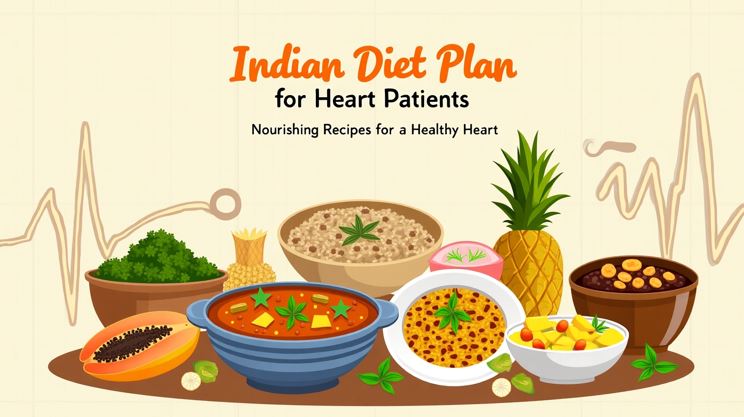Introduction
Heart disease is one of the leading health concerns in India, affecting millions of people each year. A well-balanced diet plays a crucial role in managing heart health, reducing cholesterol levels, controlling blood pressure, and preventing further complications. The traditional Indian diet, rich in whole grains, vegetables, fruits, and spices, can be highly beneficial if consumed mindfully.
In this blog, we provide a detailed Indian diet chart for heart patients, covering essential nutrients, recommended foods, and daily meal plans. This heart-healthy diet plan will help you adopt a lifestyle that supports cardiovascular well-being while allowing you to enjoy delicious Indian flavors.
1. Key Principles of a Heart-Healthy Diet
Before diving into the diet chart, it’s important to understand the fundamental principles of a heart-healthy Indian diet:
- Reduce Saturated and Trans Fats: Avoid fried and processed foods that contribute to high cholesterol levels.
- Increase Fiber Intake: Whole grains, legumes, fruits, and vegetables help lower cholesterol and improve digestion.
- Limit Salt Consumption: Excess sodium can lead to high blood pressure, increasing the risk of heart disease.
- Control Sugar Intake: High sugar levels can lead to obesity and diabetes, which are major risk factors for heart disease.
- Stay Hydrated: Drinking plenty of water and herbal teas helps flush toxins and maintain overall heart health.
Also Read:Indian Diet Plan for Weight Loss
Why Is a Heart-Healthy Diet Important?
A heart-healthy diet helps in reducing cholesterol levels, maintaining blood pressure, and preventing plaque buildup in arteries. This, in turn, minimizes the risk of heart attacks and strokes. With the abundance of traditional and healthy ingredients in Indian cuisine, you can easily adapt your meals to support heart health without compromising on flavor.
General Guidelines for Heart Patients
- Reduce Saturated and Trans Fats: Opt for oils like olive, mustard, or rice bran oil instead of butter or ghee.
- Increase Fiber Intake: Whole grains, fruits, and vegetables are rich in dietary fiber, which helps lower cholesterol levels.
- Limit Salt Consumption: High sodium levels contribute to hypertension; use herbs and spices for flavor instead.
- Stay Hydrated: Drink adequate water to maintain proper circulation and reduce blood viscosity.
- Avoid Processed Foods: These are often high in salt, sugar, and unhealthy fats.
Indian Diet Chart for Heart Patients
Early Morning (6:00 AM – 7:00 AM)
- 1 Glass of Warm Water with Lemon: Helps detoxify the body.
- 5-6 Almonds or Walnuts: Rich in omega-3 fatty acids, beneficial for heart health.
Breakfast (8:00 AM – 9:00 AM)
- Option 1: Oats porridge with low-fat milk and a handful of fresh fruits.
- Option 2: Whole-grain vegetable upma with a side of green tea.
- Option 3: Poha made with minimal oil and loaded with vegetables, garnished with lemon juice.
Mid-Morning Snack (10:30 AM – 11:00 AM)
- Option 1: 1 Seasonal Fruit (like guava, apple, or orange).
- Option 2: A small bowl of sprouts salad with a dash of lemon juice.
Lunch (1:00 PM – 2:00 PM)
- Option 1: 1-2 Multigrain Rotis + 1 Bowl of Palak Paneer (made with low-fat paneer) + 1 Bowl of Curd + Fresh Salad.
- Option 2: Brown Rice + Dal Tadka (minimal oil) + Steamed Vegetables.
- Option 3: Khichdi made with lentils and vegetables + Mint Chutney.
Evening Snack (4:00 PM – 5:00 PM)
- Option 1: A handful of roasted chana or makhana.
- Option 2: 1 Glass of Coconut Water.
- Option 3: Herbal tea with a slice of whole-grain toast.
Dinner (7:00 PM – 8:00 PM)
- Option 1: Grilled fish or tofu + Steamed vegetables + 1 Multigrain Roti.
- Option 2: Lentil soup + 1 Bowl of Vegetable Salad.
- Option 3: Vegetable daliya (cracked wheat) with a small bowl of curd.
Bedtime Snack (9:00 PM – 10:00 PM)
- Option 1: 1 Glass of Warm Turmeric Milk (made with low-fat milk).
- Option 2: A small handful of walnuts or flaxseeds.
Foods to Include in a Heart-Healthy Indian Diet
1. Whole Grains
Brown rice, oats, quinoa, and whole wheat atta are excellent choices for providing fiber and maintaining healthy cholesterol levels.
2. Leafy Greens and Vegetables
Spinach, broccoli, carrots, and beets are rich in vitamins, minerals, and antioxidants essential for heart health.
3. Fruits
Apples, oranges, berries, and papayas are loaded with nutrients and are great for snacking or adding to meals.
4. Nuts and Seeds
Walnuts, almonds, chia seeds, and flaxseeds provide omega-3 fatty acids that help reduce inflammation and improve heart function.
5. Legumes and Pulses
Lentils, chickpeas, and kidney beans are low in fat and high in protein and fiber, making them heart-friendly options.
6. Healthy Fats
Use oils like olive oil, mustard oil, or rice bran oil in moderation. Avoid hydrogenated oils and trans fats.
Foods to Avoid for Heart Health
1. Deep-Fried Foods
Avoid pakoras, samosas, and other deep-fried snacks as they are high in unhealthy fats.
2. Sugary Foods and Beverages
Limit sweets, pastries, and sugary drinks as they contribute to weight gain and increase the risk of heart disease.
3. Processed Meats
Sausages, salami, and bacon are high in sodium and unhealthy fats, which can harm your heart.
4. Excess Salt
Avoid pickles, papads, and packaged snacks that are loaded with salt.
Tips for Following a Heart-Healthy Diet
- Practice Portion Control: Overeating, even healthy foods, can lead to weight gain.
- Read Food Labels: Check for hidden salts, sugars, and unhealthy fats in packaged foods.
- Incorporate Physical Activity: Regular exercise complements a heart-healthy diet.
- Stay Consistent: Gradual and consistent dietary changes are more sustainable in the long run.
Conclusion: Indian Diet Chart for Heart Patients
Taking care of your heart is a lifelong commitment, but it doesn’t have to be overwhelming. By following this Indian diet chart and incorporating nutrient-rich, flavorful foods into your meals, you can manage your heart health effectively. Remember, small steps can lead to big changes. Prioritize your health today for a healthier tomorrow!

